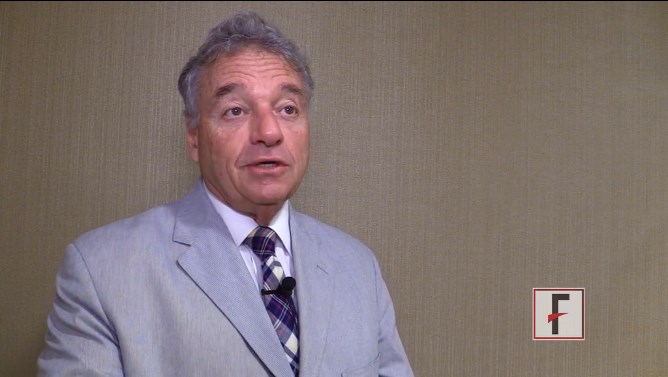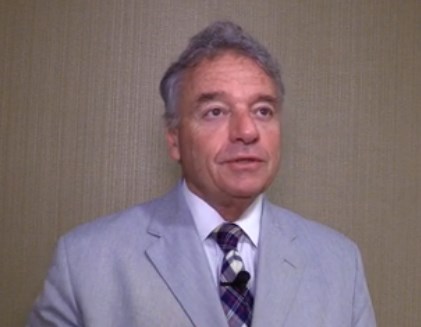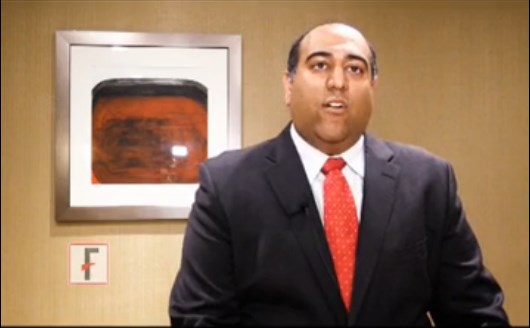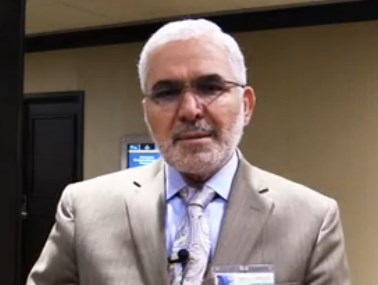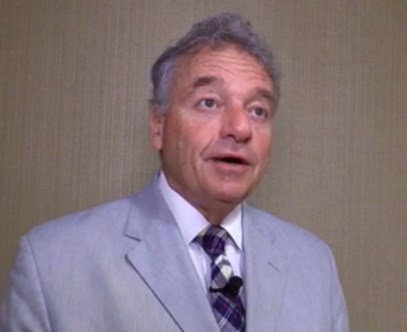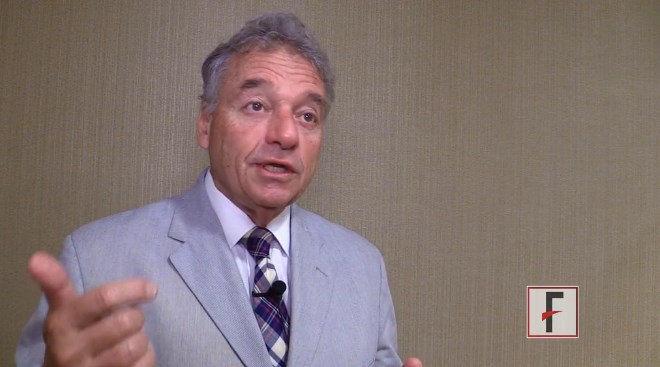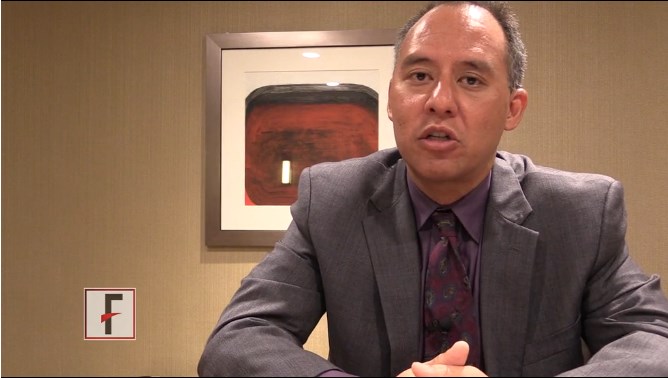User login
VIDEO: How can opioid blocking help treat ‘food addiction’?
WASHINGTON – How do naltrexone and naloxone work in the brain to help treat opioid and alcohol dependence, and what are the implications for those who have what Dr. Mark S. Gold of the department of psychiatry at Washington University in St. Louis calls “food addiction”? In this video, recorded at the Summit in Neurology & Psychiatry held by the Global Academy for Medical Education, Dr. Gold discusses the mechanism of action for these opioid agonists and their role in addiction treatment. The Global Academy and this news organization are owned by the same company.
The video associated with this article is no longer available on this site. Please view all of our videos on the MDedge YouTube channel
On Twitter @whitneymcknight
WASHINGTON – How do naltrexone and naloxone work in the brain to help treat opioid and alcohol dependence, and what are the implications for those who have what Dr. Mark S. Gold of the department of psychiatry at Washington University in St. Louis calls “food addiction”? In this video, recorded at the Summit in Neurology & Psychiatry held by the Global Academy for Medical Education, Dr. Gold discusses the mechanism of action for these opioid agonists and their role in addiction treatment. The Global Academy and this news organization are owned by the same company.
The video associated with this article is no longer available on this site. Please view all of our videos on the MDedge YouTube channel
On Twitter @whitneymcknight
WASHINGTON – How do naltrexone and naloxone work in the brain to help treat opioid and alcohol dependence, and what are the implications for those who have what Dr. Mark S. Gold of the department of psychiatry at Washington University in St. Louis calls “food addiction”? In this video, recorded at the Summit in Neurology & Psychiatry held by the Global Academy for Medical Education, Dr. Gold discusses the mechanism of action for these opioid agonists and their role in addiction treatment. The Global Academy and this news organization are owned by the same company.
The video associated with this article is no longer available on this site. Please view all of our videos on the MDedge YouTube channel
On Twitter @whitneymcknight
AT THE SUMMIT IN NEUROLOGY & PSYCHIATRY
VIDEO: Addiction-treatment workforce too small to cope with demand
WASHINGTON – “No one would say the reversal of the medical effects of [illicit drug use] is ‘treatment,’ ” says Dr. Mark S. Gold, an addiction specialist in the department of psychiatry at Washington University in St. Louis. That’s only the beginning, he says. After patients with drug addictions are stabilized, then begins the complicated and lengthy task of treatment. Yet, there is a coming shortage of medical personnel qualified to offer addiction treatment, says Dr. Gold, who cites that – in the next decade – the addiction-treatment workforce will be 10 times too small to meet the demand. In this video, recorded at the Summit in Neurology & Psychiatry held by the Global Academy for Medical Education, Dr. Gold discusses ways that primary care physicians and others can help. The Global Academy and this news organization are owned by the same company.
The video associated with this article is no longer available on this site. Please view all of our videos on the MDedge YouTube channel
On Twitter @whitneymcknight
WASHINGTON – “No one would say the reversal of the medical effects of [illicit drug use] is ‘treatment,’ ” says Dr. Mark S. Gold, an addiction specialist in the department of psychiatry at Washington University in St. Louis. That’s only the beginning, he says. After patients with drug addictions are stabilized, then begins the complicated and lengthy task of treatment. Yet, there is a coming shortage of medical personnel qualified to offer addiction treatment, says Dr. Gold, who cites that – in the next decade – the addiction-treatment workforce will be 10 times too small to meet the demand. In this video, recorded at the Summit in Neurology & Psychiatry held by the Global Academy for Medical Education, Dr. Gold discusses ways that primary care physicians and others can help. The Global Academy and this news organization are owned by the same company.
The video associated with this article is no longer available on this site. Please view all of our videos on the MDedge YouTube channel
On Twitter @whitneymcknight
WASHINGTON – “No one would say the reversal of the medical effects of [illicit drug use] is ‘treatment,’ ” says Dr. Mark S. Gold, an addiction specialist in the department of psychiatry at Washington University in St. Louis. That’s only the beginning, he says. After patients with drug addictions are stabilized, then begins the complicated and lengthy task of treatment. Yet, there is a coming shortage of medical personnel qualified to offer addiction treatment, says Dr. Gold, who cites that – in the next decade – the addiction-treatment workforce will be 10 times too small to meet the demand. In this video, recorded at the Summit in Neurology & Psychiatry held by the Global Academy for Medical Education, Dr. Gold discusses ways that primary care physicians and others can help. The Global Academy and this news organization are owned by the same company.
The video associated with this article is no longer available on this site. Please view all of our videos on the MDedge YouTube channel
On Twitter @whitneymcknight
AT THE SUMMIT IN NEUROLOGY & PSYCHIATRY
VIDEO: Helping patients sleep better can be simple
WASHINGTON – Sleep disorders can be treated easily in the primary care setting, although there are times when it’s best to refer to a sleep clinic. Dr. Raman K. Malhotra of the department of neurology at Saint Louis University, shares ways to help determine when a patient is presenting with sleep disorders vs. mood disorders. He also offers tips for patients, who can get the rest they need, once their sleep habits are adjusted. Also discussed in this video, recorded at the meeting held by the Global Academy for Medical Education, is the use of melatonin and iron supplementation to combat restless legs syndrome. Global Academy and this news organization are owned by the same company.
On Twitter @whitneymcknight
WASHINGTON – Sleep disorders can be treated easily in the primary care setting, although there are times when it’s best to refer to a sleep clinic. Dr. Raman K. Malhotra of the department of neurology at Saint Louis University, shares ways to help determine when a patient is presenting with sleep disorders vs. mood disorders. He also offers tips for patients, who can get the rest they need, once their sleep habits are adjusted. Also discussed in this video, recorded at the meeting held by the Global Academy for Medical Education, is the use of melatonin and iron supplementation to combat restless legs syndrome. Global Academy and this news organization are owned by the same company.
On Twitter @whitneymcknight
WASHINGTON – Sleep disorders can be treated easily in the primary care setting, although there are times when it’s best to refer to a sleep clinic. Dr. Raman K. Malhotra of the department of neurology at Saint Louis University, shares ways to help determine when a patient is presenting with sleep disorders vs. mood disorders. He also offers tips for patients, who can get the rest they need, once their sleep habits are adjusted. Also discussed in this video, recorded at the meeting held by the Global Academy for Medical Education, is the use of melatonin and iron supplementation to combat restless legs syndrome. Global Academy and this news organization are owned by the same company.
On Twitter @whitneymcknight
AT THE SUMMIT IN NEUROLOGY & PSYCHIATRY
VIDEO: The coming revolution in brain science
WASHINGTON – What is the chief role of the brain? According to Dr. Henry A. Nasrallah, professor and chair of the department of neurology & psychiatry at Saint Louis University, it is to generate the mind. In this video, recorded at the Summit in Neurology & Psychiatry held by the Global Academy for Medical Education, Dr. Nasrallah explains how neurology and psychiatry, once considered two halves of the same field of study, separated, but are now reuniting. He also discusses what this means for the future of both mind and brain science.
The Global Academy and this news organization are owned by the same company.
The video associated with this article is no longer available on this site. Please view all of our videos on the MDedge YouTube channel
On Twitter @whitneymcknight
WASHINGTON – What is the chief role of the brain? According to Dr. Henry A. Nasrallah, professor and chair of the department of neurology & psychiatry at Saint Louis University, it is to generate the mind. In this video, recorded at the Summit in Neurology & Psychiatry held by the Global Academy for Medical Education, Dr. Nasrallah explains how neurology and psychiatry, once considered two halves of the same field of study, separated, but are now reuniting. He also discusses what this means for the future of both mind and brain science.
The Global Academy and this news organization are owned by the same company.
The video associated with this article is no longer available on this site. Please view all of our videos on the MDedge YouTube channel
On Twitter @whitneymcknight
WASHINGTON – What is the chief role of the brain? According to Dr. Henry A. Nasrallah, professor and chair of the department of neurology & psychiatry at Saint Louis University, it is to generate the mind. In this video, recorded at the Summit in Neurology & Psychiatry held by the Global Academy for Medical Education, Dr. Nasrallah explains how neurology and psychiatry, once considered two halves of the same field of study, separated, but are now reuniting. He also discusses what this means for the future of both mind and brain science.
The Global Academy and this news organization are owned by the same company.
The video associated with this article is no longer available on this site. Please view all of our videos on the MDedge YouTube channel
On Twitter @whitneymcknight
AT THE SUMMIT IN NEUROLOGY & PSYCHIATRY
VIDEO: Watch for anxiety, other symptoms in cannabis users on anti-cannabinoids
WASHINGTON – The physical withdrawal symptoms of cannabis users given anti-cannabinoids resemble those of people withdrawing from opioid use by taking naloxone, according to Dr. Mark S. Gold. In this interview, recorded at the Summit in Neurology & Psychiatry sponsored by the Global Academy for Medical Education, Dr. Gold of the department of psychiatry at Washington University in St. Louis, describes withdrawal from cannabis, including symptoms of anxiety, panic, and confusion. Global Academy and this news organization are owned by the same company.
The video associated with this article is no longer available on this site. Please view all of our videos on the MDedge YouTube channel
On Twitter @whitneymcknight
WASHINGTON – The physical withdrawal symptoms of cannabis users given anti-cannabinoids resemble those of people withdrawing from opioid use by taking naloxone, according to Dr. Mark S. Gold. In this interview, recorded at the Summit in Neurology & Psychiatry sponsored by the Global Academy for Medical Education, Dr. Gold of the department of psychiatry at Washington University in St. Louis, describes withdrawal from cannabis, including symptoms of anxiety, panic, and confusion. Global Academy and this news organization are owned by the same company.
The video associated with this article is no longer available on this site. Please view all of our videos on the MDedge YouTube channel
On Twitter @whitneymcknight
WASHINGTON – The physical withdrawal symptoms of cannabis users given anti-cannabinoids resemble those of people withdrawing from opioid use by taking naloxone, according to Dr. Mark S. Gold. In this interview, recorded at the Summit in Neurology & Psychiatry sponsored by the Global Academy for Medical Education, Dr. Gold of the department of psychiatry at Washington University in St. Louis, describes withdrawal from cannabis, including symptoms of anxiety, panic, and confusion. Global Academy and this news organization are owned by the same company.
The video associated with this article is no longer available on this site. Please view all of our videos on the MDedge YouTube channel
On Twitter @whitneymcknight
AT THE SUMMIT IN NEUROLOGY & PSYCHIATRY
VIDEO: Beware of dehydration, hyperthermia in drug-taking concert-goers, or ‘ravers’*
WASHINGTON – Because “drugs and food compete in the brain for the same reinforcement sites,” people who take drugs while attending festival concerts or rave parties need to be cautious, says Dr. Mark S. Gold, an addiction specialist and the “rock doc” at Woodstock in 1969. “There were a lot of drugs at Woodstock, but no food,” recalled Dr. Gold at the Summit in Neurology & Psychiatry held by the Global Academy for Medical Education. “Sex, drugs, and rock and roll make a person feel like they don’t need to eat,” said Dr. Gold of the department of psychiatry at Washington University in St. Louis. In this video, Dr. Gold shares tips on treating patients who take “club drugs” while attending concerts or raves, including those who suffer from dehydration and hyperthermia as a result.
The video associated with this article is no longer available on this site. Please view all of our videos on the MDedge YouTube channel
The Global Academy and this news organization are owned by the same company.
*Correction, 7/16/2015: An earlier version of this story misstated the possible side effects of 'club drug' use at raves or concerts.
On Twitter @whitneymcknight
WASHINGTON – Because “drugs and food compete in the brain for the same reinforcement sites,” people who take drugs while attending festival concerts or rave parties need to be cautious, says Dr. Mark S. Gold, an addiction specialist and the “rock doc” at Woodstock in 1969. “There were a lot of drugs at Woodstock, but no food,” recalled Dr. Gold at the Summit in Neurology & Psychiatry held by the Global Academy for Medical Education. “Sex, drugs, and rock and roll make a person feel like they don’t need to eat,” said Dr. Gold of the department of psychiatry at Washington University in St. Louis. In this video, Dr. Gold shares tips on treating patients who take “club drugs” while attending concerts or raves, including those who suffer from dehydration and hyperthermia as a result.
The video associated with this article is no longer available on this site. Please view all of our videos on the MDedge YouTube channel
The Global Academy and this news organization are owned by the same company.
*Correction, 7/16/2015: An earlier version of this story misstated the possible side effects of 'club drug' use at raves or concerts.
On Twitter @whitneymcknight
WASHINGTON – Because “drugs and food compete in the brain for the same reinforcement sites,” people who take drugs while attending festival concerts or rave parties need to be cautious, says Dr. Mark S. Gold, an addiction specialist and the “rock doc” at Woodstock in 1969. “There were a lot of drugs at Woodstock, but no food,” recalled Dr. Gold at the Summit in Neurology & Psychiatry held by the Global Academy for Medical Education. “Sex, drugs, and rock and roll make a person feel like they don’t need to eat,” said Dr. Gold of the department of psychiatry at Washington University in St. Louis. In this video, Dr. Gold shares tips on treating patients who take “club drugs” while attending concerts or raves, including those who suffer from dehydration and hyperthermia as a result.
The video associated with this article is no longer available on this site. Please view all of our videos on the MDedge YouTube channel
The Global Academy and this news organization are owned by the same company.
*Correction, 7/16/2015: An earlier version of this story misstated the possible side effects of 'club drug' use at raves or concerts.
On Twitter @whitneymcknight
AT THE SUMMIT IN NEUROLOGY & PSYCHIATRY
VIDEO: Anticipatory guidance can reduce chronic postconcussion syndrome
WASHINGTON – Regardless of the number of tests and tools for helping to diagnose pediatric sports concussions, Dr. Christopher Giza, professor of pediatric neurology and neurosurgery at the University of California, Los Angeles, says it’s important for clinicians to remember that “concussion is a clinical diagnosis.”
In this video interview recorded at Summit in Neurology & Psychiatry, Dr. Giza offers pearls and insights into the latest in sports concussion management. He describes the four “Rs” of treating sports concussions and urges primary care personnel to offer anticipatory guidance to patients and their families. Such guidance can lead to a 20% decrease in chronic postconcussion syndrome in children and adolescents, he said at the meeting held by Global Academy for Medical Education. Global Academy and this news organization are owned by the same company.
The video associated with this article is no longer available on this site. Please view all of our videos on the MDedge YouTube channel
On Twitter @whitneymcknight
WASHINGTON – Regardless of the number of tests and tools for helping to diagnose pediatric sports concussions, Dr. Christopher Giza, professor of pediatric neurology and neurosurgery at the University of California, Los Angeles, says it’s important for clinicians to remember that “concussion is a clinical diagnosis.”
In this video interview recorded at Summit in Neurology & Psychiatry, Dr. Giza offers pearls and insights into the latest in sports concussion management. He describes the four “Rs” of treating sports concussions and urges primary care personnel to offer anticipatory guidance to patients and their families. Such guidance can lead to a 20% decrease in chronic postconcussion syndrome in children and adolescents, he said at the meeting held by Global Academy for Medical Education. Global Academy and this news organization are owned by the same company.
The video associated with this article is no longer available on this site. Please view all of our videos on the MDedge YouTube channel
On Twitter @whitneymcknight
WASHINGTON – Regardless of the number of tests and tools for helping to diagnose pediatric sports concussions, Dr. Christopher Giza, professor of pediatric neurology and neurosurgery at the University of California, Los Angeles, says it’s important for clinicians to remember that “concussion is a clinical diagnosis.”
In this video interview recorded at Summit in Neurology & Psychiatry, Dr. Giza offers pearls and insights into the latest in sports concussion management. He describes the four “Rs” of treating sports concussions and urges primary care personnel to offer anticipatory guidance to patients and their families. Such guidance can lead to a 20% decrease in chronic postconcussion syndrome in children and adolescents, he said at the meeting held by Global Academy for Medical Education. Global Academy and this news organization are owned by the same company.
The video associated with this article is no longer available on this site. Please view all of our videos on the MDedge YouTube channel
On Twitter @whitneymcknight
AT SUMMIT IN NEUROLOGY & PSYCHIATRY
